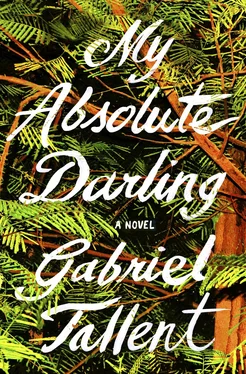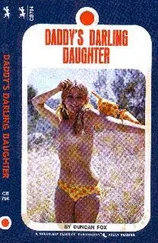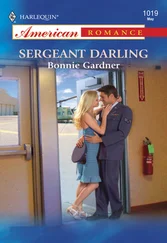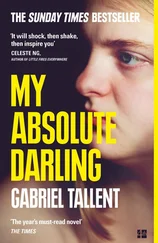The bell rings. Turtle turns and looks back to the school above her on the hill. Low buildings, covered walkways, throng of raincoated middle schoolers, clogged downspouts sheeting water.
It is mid-April, almost two weeks since the meeting with Anna. Blackberries have clambered into the old apple trees and are knitted into a wildly blooming canopy. Quail mince in nervous coteries, topknots bobbing, while sparrows and finches go wheeling and banking among the trunks. She comes out of the orchard and through the staked raspberry field to Grandpa’s trailer. Streaks of mold have run down the panels. The aluminum coping around the windows is caulked with moss. Pockets of leaf litter grow cypress shoots. She hears Rosy, Grandpa’s old dachshund/beagle mutt, heave herself up and come to the door, shaking herself and setting her collar to tinkling. Then the door is thrown open, and Grandpa stands in the doorway and says, “Hey there, sweetpea.”
She climbs up the steps and leans the AR-10 against the doorjamb. It is her gun, a Lewis Machine & Tool rifle with a U.S. Optics 5-25x44 scope. She loves it, but it’s too damn heavy. Rosy hops up and down, flopping her ears.
“Who’s a good dog?” Turtle asks Rosy.
Rosy shakes herself excitedly, wagging her tail.
Grandpa settles at the foldout table, pours himself two fingers of Jack. Turtle sits down opposite him, takes her Sig Sauer from a concealment holster in her jeans, drops the magazine, and leaves the gun on the table, locked open, because Grandpa says that when a man plays cribbage with his granddaughter, the two of them should be unarmed.
He says, “Have you come to play some cribbage with your grandpa?”
“Yeah,” she says.
“You know why you like cribbage, sweetpea?”
“Why, Grandpa?”
“Because cribbage, sweetpea, is a game of low animal cunning.”
She looks up at him, smiling a little, because she does not at all know what he means.
“Ah, sweetpea,” he says, “I’m joking with you.”
“Oh,” she says, and allows her smile to overtake her whole face, turning a little away from him, touching her thumb to her teeth shyly. It feels so good to have Grandpa teasing with her, even if she doesn’t understand.
He is looking at her Sig Sauer. He reaches across the table, sets a hand on it, lifts it up. The slide is locked back, the barrel is exposed, and he inspects it for fouling and touches it with a finger pad for grease, turning it this way and that way in the light. “Your daddy takes care of this gun for you?” he says.
She shakes her head.
“You take care of this gun for yourself?” he says.
“Yeah.”
He swings the takedown lever and drops the slide catch. Carefully he removes the slide from the frame, sits inspecting the rails.
“But you never fire this thing,” he says.
Turtle picks up a deck of cards, shucks it out of the case, splits the deck, shuffles and bridges them. The cards slither with satin-finish friction. She racks the deck sharply against the tabletop.
“You do fire it,” he says.
“Why is it a game of low animal cunning?” she says, breaking the deck and examining the halves in either hand.
“Oh, I don’t know,” he says. “That’s just what they say.”
Every night she disassembles the gun and cleans it with a brass-bristled brush and with cotton patches. Grandpa sits looking into the clean, well-worn rails, and then he returns the slide to the frame. His fingers shake, holding the slide in place against the recoil spring. He seems to have forgotten how to engage the takedown lever, sits looking at the catches and levers as if hesitating, as if for a moment he has lost his bearings on the gun. Turtle does not know what to do. She sits with the halves of the deck still in her hands. Then he finds the takedown lever and tries it twice before he manages to get the tight-fit steel tab to rotate, and then he pushes it into place, his hands shaking, and lets the slide relax forward. He sets the gun aside and looks at her. Turtle shuffles, bridges, slaps the deck down in front of him.
“Well,” he says. “You’re not your old man, that’s for sure.”
“What?” Turtle says, curious.
“Oh,” Grandpa says, “never mind, never mind.”
He extends a shaking hand and cuts the deck. Turtle picks it back up and deals them each six cards. Grandpa fans the cards before him, and sighs, making slight adjustments with thumb and forefinger. Turtle discards her crib. Grandpa sighs again and encircles his whiskey in one big hand and sits, turning it slowly in the ring of its condensation, the soapstones sounding softly against the glass.
He tosses back the drink, sucks air through his teeth, pours himself another. Turtle waits, silent. He tosses this back, and pours himself a third. He sits rotating it slowly. Finally, he picks two cards and tosses them into the crib. Then he cuts the deck and Turtle draws off the start card, the queen of hearts, and lays it faceup. He seems about to remark on how the start card has determined the fate of his hand, as if—on the verge of this observation—he is struck mute by the complexity of it.
“The rails on that gun,” he says after a minute, “look pretty good.”
“Yeah,” Turtle says.
“Well, they look pretty good,” Grandpa says again, doubtfully.
“I keep them oiled,” she says.
Grandpa looks around the trailer, suddenly, wonderingly. His eyes run across the ceiling, across the ersatz wood paneling peeling away in places, over the dingy little kitchen. There is laundry on the floor in the hallway and Grandpa frowns severely, looking at it all.
“It’s your play,” Turtle says.
Grandpa teases one card from the others, throws it down. “Ten,” he says.
Turtle throws down a five, pegs two for fifteen.
“Grandpa?” she says.
“Twenty,” he says, pegging two for the pair.
“Thirty,” Turtle says, throwing down a jack.
“Go.”
Turtle pegs one for the go, throws a queen. Grandpa lays down a seven in seeming exhaustion. Turtle throws a three, for twenty. Grandpa throws a six, says, “Here, sweetpea,” and unbuckles his belt and draws off it the old bowie knife. The belt leather is worn shiny black from the sheath, and he holds it out to her in his open hand, hefting it. “I don’t use it anymore,” he says.
Turtle says, “Put that down, Grandpa. We still need to score the hand.”
“Sweetpea,” Grandpa says, holding out the knife.
“Let’s see what’s in your hand,” Turtle says.
Grandpa puts the knife down on the table in front of her. The leather handle is old and black with grease, the steel pummel dark gray. Turtle reaches across the table, collects Grandpa’s hand, and pulls it forward to her. She gathers the four cards together and looks at them: the five of spades, the six of spades, seven of spades, ten of spades, and the start card, the queen of diamonds. “Well,” Turtle says, “well.” Grandpa doesn’t look at his cards, he just looks at her. Turtle’s mouth moves with her counting. “Fifteen for two, fifteen for four, the run for seven, and the flush for eleven points. Did I miss anything?” She pegs him eleven points.
Grandpa says, “Pick that up, sweetpea.”
She says, “I don’t understand, Grandpa.”
He says, “You’re entitled to a thing or two of mine.”
She cracks one knuckle, then another.
He says, “You’ll take good care of it. It’s a good one. You ever stick a son of a bitch with this, he’ll sit up and take notice. This knife comes from me to you.”
She draws it from the sheath. The steel is smoky black with age. Oxidized in the way of very old carbon steel. She turns the blade to face her and it shows a single unbroken, unglinting line without nicks or flaws, a shining, polished edge. She passes the blade gently up her arm and golden hairs accumulate in a tide line.
Читать дальше
Конец ознакомительного отрывка
Купить книгу












